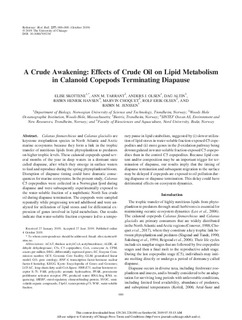| dc.contributor.author | Skottene, Elise | |
| dc.contributor.author | Tarrant, Ann | |
| dc.contributor.author | Olsen, Anders | |
| dc.contributor.author | Altin, Dag | |
| dc.contributor.author | Hansen, Bjørn Henrik | |
| dc.contributor.author | Choquet, Marvin | |
| dc.contributor.author | Olsen, Rolf Erik | |
| dc.contributor.author | Jenssen, Bjørn Munro | |
| dc.date.accessioned | 2019-10-16T12:55:15Z | |
| dc.date.available | 2019-10-16T12:55:15Z | |
| dc.date.created | 2019-10-15T15:51:46Z | |
| dc.date.issued | 2019 | |
| dc.identifier.issn | 0006-3185 | |
| dc.identifier.uri | http://hdl.handle.net/11250/2622594 | |
| dc.description.abstract | Calanus finmarchicus and Calanus glacialis are keystone zooplankton species in North Atlantic and Arctic marine ecosystems because they form a link in the trophic transfer of nutritious lipids from phytoplankton to predators on higher trophic levels. These calanoid copepods spend several months of the year in deep waters in a dormant state called diapause, after which they emerge in surface waters to feed and reproduce during the spring phytoplankton bloom. Disruption of diapause timing could have dramatic consequences for marine ecosystems. In the present study, Calanus C5 copepodites were collected in a Norwegian fjord during diapause and were subsequently experimentally exposed to the water-soluble fraction of a naphthenic North Sea crude oil during diapause termination. The copepods were sampled repeatedly while progressing toward adulthood and were analyzed for utilization of lipid stores and for differential expression of genes involved in lipid metabolism. Our results indicate that water-soluble fraction exposure led to a temporary pause in lipid catabolism, suggested by (i) slower utilization of lipid stores in water-soluble fraction-exposed C5 copepodites and (ii) more genes in the β-oxidation pathway being downregulated in water-soluble fraction-exposed C5 copepodites than in the control C5 copepodites. Because lipid content and/or composition may be an important trigger for termination of diapause, our results imply that the timing of diapause termination and subsequent migration to the surface may be delayed if copepods are exposed to oil pollution during diapause or diapause termination. This delay could have detrimental effects on ecosystem dynamics. | nb_NO |
| dc.language.iso | eng | nb_NO |
| dc.publisher | University of Chicago Press | nb_NO |
| dc.title | A Crude Awakening: Effects of Crude Oil on Lipid Metabolism in Calanoid Copepods Terminating Diapause | nb_NO |
| dc.type | Journal article | nb_NO |
| dc.type | Peer reviewed | nb_NO |
| dc.description.version | publishedVersion | nb_NO |
| dc.source.volume | 237 | nb_NO |
| dc.source.journal | The Biological Bulletin | nb_NO |
| dc.source.issue | 2 | nb_NO |
| dc.identifier.doi | 10.1086/705234 | |
| dc.identifier.cristin | 1737292 | |
| dc.description.localcode | © 2019 The University of Chicago, locked until 4.10.2020 due to copyright restrictions. | nb_NO |
| cristin.unitcode | 194,66,10,0 | |
| cristin.unitname | Institutt for biologi | |
| cristin.ispublished | true | |
| cristin.fulltext | original | |
| cristin.qualitycode | 1 | |
